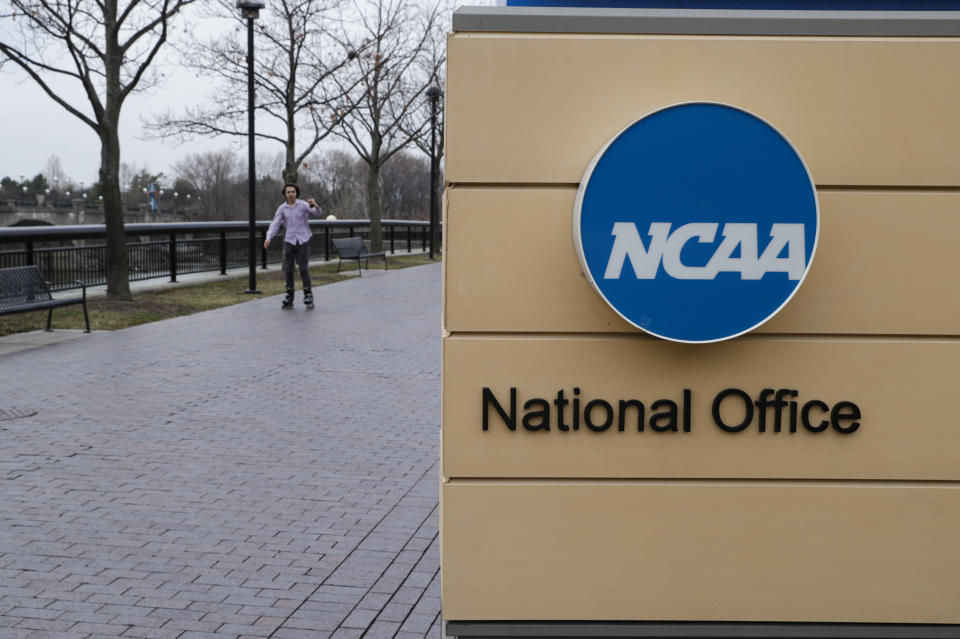NCAA board recommends against major change to transfer rules
What happens when the NCAA’s highest-ranking governing body does not support an anticipated rule change? We’ll likely find out next month.
The NCAA Division I Council is expected to vote on the hotly debated one-time transfer exemption on May 20. The exemption would allow athletes in football, men’s basketball, women’s basketball, hockey and baseball to transfer to a new school without having to sit out the following season for the so-called “year-in-residence.” Athletes in all other sports can compete immediately at their new school after transferring.
The NCAA’s Board of Directors met this week and the one-time transfer exemption was a topic of conversation. On Thursday, the NCAA revealed that the board is recommending against implementing changes to the transfer waiver process “at this time.” In a press release, the ongoing coronavirus pandemic was cited as a reason.
“The board recommended to the Council that changes to the waiver process as suggested by the working group are not appropriate at this time,” the release said. “Board members recommended the waiver process be sensitive to student-athlete well-being, especially those impacted by COVID-19 in the interim period.”

Despite board recommendation, vote can still happen in May
In February, the NCAA’s Division I Transfer Waiver Working Group, which was tasked with “studying potential changes to the waiver process,” came out in support of the proposal. The potential change was initially pushed by the Big Ten and later publicly backed by the ACC.
Despite the Board of Directors’ recommendation, the Division I Council can still vote to change the rule next month. Since the proposal was made public earlier this year, reports on whether or not it was expected to pass have varied. Though a vote still may take place, it looks like the issue will be pushed down the road.
The Athletic reported Thursday that more “comprehensive” transfer waiver legislation will likely be considered for the 2020-21 cycle. In that case, the earliest a vote could come is January. MAC commissioner Jon Steinbrecher, the chair of the Transfer Waiver Working Group, told Stadium that he is optimistic the change will be made prior to the 2021-22 season.
Biggest impact felt in basketball
Whenever the rule changes, its biggest impact would be felt in basketball — where hundreds and hundreds of players transfer each offseason. A significant portion of that group is immediately-eligible graduate transfers, but the majority sit out for a season as mandated under current NCAA bylines.
Some coaches have come out in strong opposition to the one-time transfer rule. Purdue coach Matt Painter, a board member of the National Association of Basketball Coaches and part of the NCAA Men’s Basketball Oversight Committee, said the proposal would “bring free agency to men’s college basketball.”
MAC commissioner Jon Steinbrecher, the chair of the Transfer Waiver Working Group, however, said in February the current system in place is “unsustainable.”
“Working group members believe it’s time to bring our transfer rules more in line with today’s college landscape,” Steinbrecher said. “This concept provides a uniform approach that is understandable, predictable and objective. Most importantly, it benefits students.”
With transfers so common, many athletes apply for a waiver in order to be immediately eligible at their new school. Waivers have been granted — and denied — on a seemingly random and inconsistent basis. Steinbrecher said that the waiver process has been overwhelmed with cases and implementing the one-time transfer waiver would refocus the waiver process.
“More than a third of all college students transfer at least once, and the Division I rule prohibiting immediate competition for students who play [the] five sports hasn’t discouraged them from transferring,” Steinbrecher said. “This dynamic has strained the waiver process, which was designed to handle extenuating and extraordinary circumstances.”
More from Yahoo Sports:

